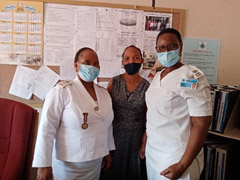- Home
- Countries & Regions
- Africa
- Botswana
- Topics & Events
- Princess Marina Hospital Feedback
Topics & Events
November 25, 2020
Princess Marina Hospital Feedback
BACKGROUND - Princess Marina Obstetrics and Gynaecology Department
The Obstetrics and Gynaecology Department comprises of the following units that serve clients on referrals who are high-risk patients from districts clinics and other small ones in the Southern Region of Botswana. They are Sexual and Reproductive Health Clinic, Labour and delivery unit, Antenatal ward, Gynaecologist, Post - natal ward, Cervical cancer clinics and Sexual STI ward. Princess Marina Hospital is a specialised facility that admits high-risk patients on referrals and occasionally assists drop in patients. Before Ms. Molope retired from civil service, she was the manager of the Sexual Reproductive Health Clinic with eight other midwives and thus attended to high risk maternal and new born patients. According the Matron, Ms. Moatshe, all the units mentioned are usually full to capacity admitting more patients than the facilities can handle.
Comments by Princess Marina Hospital
Ms. Veronica Molope attended KCCP training in 2010 under "Maternal Health (Assistance for Improvement of Regional Level Maternity Care)" in Japan on behalf of her Department. According to the matron, prior to Ms. Molope attending the KCCP training in Japan, there was no organised Ante Natal Education classes that were done for the pregnant clients, instead, the doctors or nurses shared information with clients if the need arose e.g. if a pregnant patient displayed any signs of swollen legs or complained of something. After the exposure to the Japanese training, Ms. Molope initiated the Ante-natal classes which she learnt about during the training in Japan. They were done on a weekly basis for two hours tackling different topics.
As the matron explained, the initiative was met with resistance in the beginning especially by clients' partners (Males) who stated that traditionally, they are not supposed to be involved in pregnancy issues. Over time, it became very successful, giving positive results and contributing in the health and wellbeing of the pregnant clients and that of their future offspring. Even though they did not share figures on the mortality rate before and after introductions of these classes, they did inform that their number considerably reduced as clients were armed with all the information about their pregnancy journey, development and care of the baby. The support of their partners during the pregnancy and at birth provided so much comfort for the pregnant mother to deliver a healthy baby. They also stated that it reduced the burden of hospitals, as clients could take better care of themselves. This consequently allowed hospital staff to attend to other clients especially during admission.
Following the success of the antenatal classes at Princess Marina Hospital, workshops classes were done for other nurses in clinics around Gaborone and were subsequently started at clinics in Gaborone Francistown, Letlhakane and Selibe Phikwe. Other nurses who were transferred to other clinics and hospitals around Botswana initiated the education classes as they appreciated the good results it yielded. In addition to that, the department started sharing information on BTV about ante-natal education and sexual reproductive health after realising how well received the classes were at the hospital.
Even though presently the classes have been halted due to Covid-19 pandemic and protocols, the team highly praised the training and Ms. Molope's efforts in the initiative to build a strong foundation that was also practised by other clinics. They acknowledged the importance of information and education for the expectant mother in preventing cases of maternal and child mortality rate.
 Ms. Banyana MOATSHE (Matron), Ms Khakha WATAY (Midwife), Ms. Kegomoditswe MOKGWATLHENG (Midwife)
Ms. Banyana MOATSHE (Matron), Ms Khakha WATAY (Midwife), Ms. Kegomoditswe MOKGWATLHENG (Midwife)

- Asia
- Oceania
- Latin America
- Africa
- Angola
- Benin
- Botswana
- Burkina Faso
- Burundi
- Cameroon
- Comoros
- Côte d'Ivoire
- Democratic Republic of the Congo
- Djibouti
- Eritrea
- Ethiopia
- Gabon
- Ghana
- Kenya
- Liberia
- Madagascar
- Malawi
- Mauritius
- Mozambique
- Namibia
- Niger
- Nigeria
- Rwanda
- Senegal
- Seychelles
- Sierra Leone
- Somalia
- South Africa
- South Sudan
- Sudan
- Tanzania
- Uganda
- Zambia
- Zimbabwe
- Middle East
- Europe
- About JICA
- News & Features
- Countries & Regions
- Our Work
- Thematic Issues
- Types of Assistance
- Partnerships with Other Development Partners
- Climate Change / Environmental and Social Considerations
- Evaluations
- Compliance and Anti-corruption
- Science and Technology Cooperation on Global Issues
- Research
- JICA Development Studies Program / JICA Chair
- Support for the Acceptance of Foreign HRs / Multicultural and Inclusive Community
- Publications
- Investor Relations
